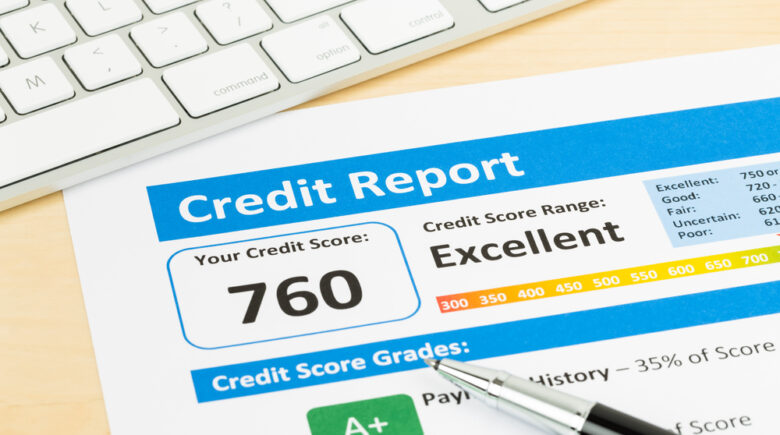If you have a bad or weak credit score, it could mean that your credit report is not getting the best results. It’s essential to understand the difference between these two resources to take steps to improve your overall score.
The credit report records your entire credit history, including accounts you’ve opened, payments you’ve made, and other information that lenders use to determine your creditworthiness. The primary credit reporting agencies are Experian, Equifax, and Transunion. Your credit report can include how often you were late paying on loan bills, your payment history, and the type of loans you have taken out. These scores are based on different factors than the ones used by lenders.
Your FICO score, for example, is a single number that indicates how likely you are to pay back what you owe from one month to the next. It’s based on the information in your credit reports. It is based on the amount of debt you owe, your credit history, and the types of credit you have obtained. It is a number ranging between 350 and 850.
According to FICO’s formula, your credit score will be lower if your score falls below 650, which means that you are considered a lower risk to creditors. Your score will be higher if it exceeds 725, which means you are considered a more substantial risk to creditors than other people with similar scores. A bad FICO score can affect your ability to get loans and significantly reduce the interest rate you pay on them. Lowering your payment amount or making late payments may negatively impact your credit score.
If you have a good credit score, you are more likely to pay the money back on time. Your score will rise if your payments are on time and your outstanding balances are low. However, there is no certainty about how much higher a credit score needs to be to get approved for a loan or the exact difference between one lender and another. You should also know that an unusually high credit score doesn’t guarantee automatic approval.
Consumers need to understand how their credit reports and credit scores are connected, so they can take appropriate steps to raise their scores or improve their reports if necessary. It’s also vital to know that there is more than one type of score and that each lender uses different formulas for determining your creditworthiness.
In addition, consumers should know that banks sometimes sell their credit card records to other vendors to generate additional income. That’s why some people who have never had credit cards in their names have learned that lenders had already reviewed their credit reports and scores to generate new accounts. The good news is that a strong credit score can make it possible to get lower rates on loans, mortgages, and even car insurance.
In many cases, consumers need to make sure that their credit scores are up-to-date and accurate before applying for any financing. A lender may have their payment record built into the scoring formula. It can result in an artificial boost that may prove beneficial. At the same time, a low score can reduce or eliminate the possibility of getting approved for financing through that company. It’s always best to understand where you stand before trying to get approved for credit, regardless of the lender a consumer is targeting.
It’s also true that landlords and insurance companies sometimes use three credit agencies when deciding whether or not you are considered a reasonable risk for leasing an apartment or insuring your home or car. Consumers can try to make sure that their credit reports and score are accurate, but they should also understand that these reports reflect past activity, not a promise of future performance.
Finally, consumers should know that they can check their credit reports online or on the phone. They should be sure to check at least each year for errors and omissions and any account inaccuracies or disputed information. Taking appropriate steps now can help consumers avoid getting denied credit later when it’s much too late.
Suppose you want to determine your credit report’s effect on your consumer credit score. In that case, you can get a copy of your credit report from each of the three major credit bureaus – Experian, Equifax, and Transunion.
First, check for accuracy.
Second, review for any accounts that you did not open.
Third, look for any incorrect information regarding addresses or other key identifiers. If any of this information appears to be inaccurate, negative information may currently be affecting your consumer credit score.
An excellent way to ensure that your personal information is accurate is with a free copy of your three major credit reports each year from annual credit report.com. If you find a mistake on one of your reports, you must contact the credit bureau directly to correct the error. For consumers who have never checked their credit report for accuracy, the process should be relatively simple and easy to understand, so make sure you are using legitimate sources of information like annualcreditreport.com.
Once you have obtained your free copies of your consumer credit reports, you must check them thoroughly for any errors or inaccuracies that could be lowering your consumer credit score. It is best to report the mistakes as soon as they are identified to be corrected and removed from your consumer credit scores at this time. In addition, if you find any other negative information which could be lowering your consumer credit score, you must contact the appropriate organization or individual to have it removed or disputed. The sooner this information is removed from your consumer credit scores, the sooner you will begin to see an improvement in your consumer credit score.
There are many validations why your credit score may not be as high as it should be. Credit scores can be lowered due to positive as well as negative factors. Failure to pay bills early or promptly and having too much available credit can contribute to a poor credit score.
In conclusion, obtaining a good credit score when applying for credit is essential.
If you want to reduce your debt, the quickest way is to pay down your debts with high-interest rates.
If you have a bad or weak credit score, it could mean that your credit report is not getting the best results. It’s essential to understand the difference between these two resources to take steps to improve your overall score.
The credit report records your entire credit history, including accounts you’ve opened, payments you’ve made, and other information that lenders use to determine your creditworthiness. The primary credit reporting agencies are Experian, Equifax, and Transunion. Your credit report can include how often you were late paying on loan bills, your payment history, and the type of loans you have taken out. These scores are based on different factors than the ones used by lenders.
Your FICO score, for example, is a single number that indicates how likely you are to pay back what you owe from one month to the next. It’s based on the information in your credit reports. It is based on the amount of debt you owe, your credit history, and the types of credit you have obtained. It is a number ranging between 350 and 850.
According to FICO’s formula, your credit score will be lower if your score falls below 650, which means that you are considered a lower risk to creditors. Your score will be higher if it exceeds 725, which means you are considered a more substantial risk to creditors than other people with similar scores. A bad FICO score can affect your ability to get loans and significantly reduce the interest rate you pay on them. Lowering your payment amount or making late payments may negatively impact your credit score.
If you have a good credit score, you are more likely to pay the money back on time. Your score will rise if your payments are on time and your outstanding balances are low. However, there is no certainty about how much higher a credit score needs to be to get approved for a loan or the exact difference between one lender and another. You should also know that an unusually high credit score doesn’t guarantee automatic approval.
Consumers need to understand how their credit reports and credit scores are connected, so they can take appropriate steps to raise their scores or improve their reports if necessary. It’s also vital to know that there is more than one type of score and that each lender uses different formulas for determining your creditworthiness.
In addition, consumers should know that banks sometimes sell their credit card records to other vendors to generate additional income. That’s why some people who have never had credit cards in their names have learned that lenders had already reviewed their credit reports and scores to generate new accounts. The good news is that a strong credit score can make it possible to get lower rates on loans, mortgages, and even car insurance.
In many cases, consumers need to make sure that their credit scores are up-to-date and accurate before applying for any financing. A lender may have their payment record built into the scoring formula. It can result in an artificial boost that may prove beneficial. At the same time, a low score can reduce or eliminate the possibility of getting approved for financing through that company. It’s always best to understand where you stand before trying to get approved for credit, regardless of the lender a consumer is targeting.
It’s also true that landlords and insurance companies sometimes use three credit agencies when deciding whether or not you are considered a reasonable risk for leasing an apartment or insuring your home or car. Consumers can try to make sure that their credit reports and score are accurate, but they should also understand that these reports reflect past activity, not a promise of future performance.
Finally, consumers should know that they can check their credit reports online or on the phone. They should be sure to check at least each year for errors and omissions and any account inaccuracies or disputed information. Taking appropriate steps now can help consumers avoid getting denied credit later when it’s much too late.
Suppose you want to determine your credit report’s effect on your consumer credit score. In that case, you can get a copy of your credit report from each of the three major credit bureaus – Experian, Equifax, and Transunion.
First, check for accuracy.
Second, review for any accounts that you did not open.
Third, look for any incorrect information regarding addresses or other key identifiers. If any of this information appears to be inaccurate, negative information may currently be affecting your consumer credit score.
An excellent way to ensure that your personal information is accurate is with a free copy of your three major credit reports each year from annual credit report.com. If you find a mistake on one of your reports, you must contact the credit bureau directly to correct the error. For consumers who have never checked their credit report for accuracy, the process should be relatively simple and easy to understand, so make sure you are using legitimate sources of information like annualcreditreport.com.
Once you have obtained your free copies of your consumer credit reports, you must check them thoroughly for any errors or inaccuracies that could be lowering your consumer credit score. It is best to report the mistakes as soon as they are identified to be corrected and removed from your consumer credit scores at this time. In addition, if you find any other negative information which could be lowering your consumer credit score, you must contact the appropriate organization or individual to have it removed or disputed. The sooner this information is removed from your consumer credit scores, the sooner you will begin to see an improvement in your consumer credit score.
There are many validations why your credit score may not be as high as it should be. Credit scores can be lowered due to positive as well as negative factors. Failure to pay bills early or promptly and having too much available credit can contribute to a poor credit score.
In conclusion, obtaining a good credit score when applying for credit is essential.
If you want to reduce your debt, the quickest way is to pay down your debts with high-interest rates.



